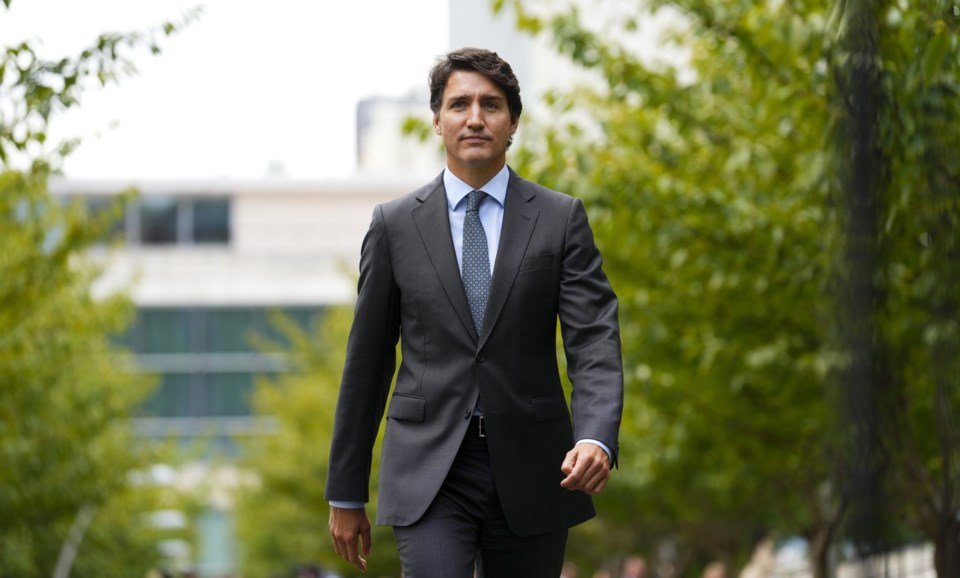Here is a roundup of stories from The Canadian Press designed to bring you up to speed...
Non-confidence vote set for later today
Prime Minister Justin Trudeau is back in Ottawa today as members of Parliament get set for a vote that could -- but likely won't -- bring down his minority government.
Conservative Leader Pierre Poilievre made his appeal to MPs during a debate in the House of Commons Tuesday, saying a future Tory government would bring back the "promise of Canada."
His call for support from the other opposition parties was quickly rebuffed.
The NDP and Bloc Québécois say they will oppose the motion in a vote that's set to happen after question period today.
Foreign meddling inquiry to hear from academics
A federal inquiry into foreign interference plans to hear today from academics who study the flow of information in an era of growing distrust and polarization.
The Media Ecosystem Observatory, a collaboration between McGill University and the University of Toronto, combines large-scale online data analysis with survey research.
The federal inquiry's latest public hearings are focusing on the ability of agencies to detect, deter and counter foreign meddling.
The hearings, which are set to continue through Oct. 16, are examining the practices of various institutions and the experiences of diaspora communities.
N.B. election: Televised leaders debate tonight
Leaders of New Brunswick's three main political parties will square off tonight for a televised debate.
The event marks a key milestone in the provincial election campaign, which started last Thursday and will end with a provincewide vote on Oct. 21.
The debate will hear from Progressive Conservative Leader Blaine Higgs, Liberal Leader Susan Holt, and Green Party Leader David Coon.
The incumbent Conservatives are seeking a third term in office.
CBC TV will begin broadcasting the debate at 6 p.m. ADT, and the event will also be carried live to an online audience at cbc.ca.
B.C. party leaders campaign on mining promises
British Columbia's New Democrats and Conservatives issued their plans for the mining industry while campaigning in the province's resource-rich communities.
Both NDP Leader David Eby and Conservative Leader John Rustad say they will support the industry by improving permitting, with the NDP committing to permit review timelines and the Conservatives proposing "One Project, One Permit."
In Terrace, Eby said an NDP government would upgrading key highway infrastructure in the northwest, while Rustad in Kimberley, in the southeast, said his government would invest in gaps in rural infrastructure.
Sonia Furstenau of the BC Greens will be the last party leader to announce plans for the carbon tax at an event in Victoria today.
'Scandalous' gap between rich and rest widening
Nova Scotia economist Lars Osberg's latest book on the widening gap between the very richest and the rest argues the trend is creating disappointed Canadians prone to distrusting one another and their governments.
In 1981, when Osberg published an earlier book — "Economic Inequality in Canada" — he noted the country was coming off four decades of growth, and inequality was stable.
Forty-three years later, his latest work — "The Scandalous rise of Inequality in Canada" (Lorimer) — describes a deepening chasm that is eroding the social cohesion needed to combat problems ranging from climate change to pandemics.
Indigenous equity ownership saw momentum in 2024
When electric utility BC Hydro launched a procurement process earlier this year seeking new sources of clean energy for the province's power grid, it included a specific requirement: projects must be at least 25 per cent owned by First Nations.
The procurement was BC Hydro’s first competitive request in more than 15 years, and the utility ended up receiving proposals for three times more energy than it was targeting. It plans to announce the successful proponents by the end of the year.
BC Hydro's power program, and its decision to mandate First Nations equity ownership requirements, was just one of a series of milestones achieved this year on the road to improved economic participation by Canada's Indigenous people.
Climate change hitting coffee supply, prices
Climate change is driving and intensifying extreme weather in the world’s major coffee-producing countries, jeopardizing future crops and putting pressure on global prices.
Brazil and Vietnam are currently grappling with drought, with Brazil seeing its worst bout in more than 70 years.
Experts say climate change’s impact on coffee is only expected to worsen, driving prices higher for consumers.
Agricultural economist Sven Anders says rising demand for coffee is also amplifying pressure on the industry as supply threatens to shrink.
He also says the wildfires ravaging parts of Brazil will likely exacerbate the damage on coffee crops this year.
---
This report by The Canadian Press was first published Sept. 25, 2024
The Canadian Press




